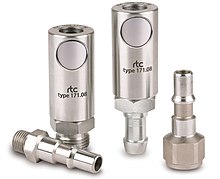Air-line fitting

Also known as pneumatic couplings, quick disconnects, air couplers, quick connect couplers, and quick couplers, hand-operable air-line fittings allow manual disconnection of gas supply lines, including compressed air and breathable air (a subset of breathing gases). Most fittings do not have regional standardization but have become de facto standards through popular adoption.
Mechanical structure[edit]

A coupled pair consists of a male nipple or plug and a female coupler or socket. One side is connected to a flexible supply hose; the other may be attached to a manifold, valve, tool, or another hose. A female coupler is used on the supply side, and a male nipple is used on the receiving side.
Fitting profiles have identifiable geometry on the male end, but care must be taken to use a compatible coupler. Couplers use springs and balls to lock mating nipples into place. A seal is effected using O-rings along the shaft of the nipple or by compression by the tip. Although incompatible pairs may latch, the sealing performance may be compromised.
Features[edit]
- Push-to-connect or automatic couplings automatically lock when assembled.
- ISO 4414 "safety" couplings use two-stage unlocking to vent air prior to disconnection, thereby preventing hose whip.
Breathable air applications[edit]
For breathable air applications such as SCBA, these may found on both sides of the first-stage and second-stage pressure regulators (very similar to SCUBA diving regulators) to allow for rapid and tool-free return-to-service.[1] For breathable air applications such as supplied-air and mixed supplied-air with SCBA backup, the quick-disconnect fittings allow movement of a worker from one supplied-air station to another.
Other applications[edit]
These fittings or special-service variants may also be found in hydraulic applications and alternative compressed gas applications (Oxy-acetylene welding and cutting, fuel gases, NSF C-2 food-contact, etc.).
Common fitting profiles by size[edit]
European convention uses DN (nominal diameter) to denote a nominal size of each fitting. Various manufacturers specify series or styles for each profile. Fittings are commonly referred to by their manufacturer name/series, i.e., "Rectus 25" for the common European standard. Proprietary designs supported by a single manufacturer are not included in this table.[2][3]
| Manufacturer Series | |||||||||
|---|---|---|---|---|---|---|---|---|---|
| Profile | Description | DN | Standards | CEJN | Rectus | Parker | Milton | PCL | Walther |
| German/Walther 2.5 | 2.5 | 141 | 50 | LP-002 | |||||
| German/Walther 2.7 | 2.7 | 20/91 | 06-003 | ||||||
| US Industrial 1/8" HP | 3 | ISO 6150C | 303 | ||||||
| German/Camozzi/EWO/Kani | 5 | 223 | 21/90 | ||||||
| Schrader 1/4" | 5 | 17 | TL | PF | |||||
| US Industrial 1/4" | 5.3/5.5 | A-A-59439, ANSI T3.20.14-1990,MIL-C-4109F, ISO 6150B | 310 | 23/24 | 20/30 | M | ISO B12 | ||
| US Industrial 1/4" HP | 5.5 | ISO 6150C | 291 | 18 | |||||
| Tru-Flate/Automotive 1/4" | 10 | T | |||||||
| ARO 210 | 5.5 | 300 | 14/22 | 50 | A | A Style | |||
| Lincoln | 70 | L | |||||||
| UK/English Industrial/PCL | 5.5 | 19 | Standard | ||||||
| German/Walther 6 LP | 6 | 52 | LP-006 | ||||||
| German/Walther 6 SP | 6 | 51 | SP-006 | ||||||
| Scandinavian 6.5/7.4 | 6.5/7.4 | 303 | 31/1300 | ||||||
| Hi-Flow/Eurostandard 7.2 | 7.2/7.4 | 320 | 25/26 | V | XF-Euro | ||||
| Asian/Japanese/Nitto | 7.5 | 315 | 13 | KF | |||||
| Tru-Flate/Automotive 3/8" | 10 | P | |||||||
| US Industrial 3/8" | 8.2/8.5 | A-A-59439, ISO 6150B | 430 | 30 | 20/30 | H | |||
| US Industrial 3/8" HP | 8 | ISO 6150C | 381 | 84 | |||||
| ARO 310 | 9 | 40 | AA | ||||||
| Scandinavian 9.5/10 | 9.5/10 | 408 | 32/1800 | ||||||
| Eurostandard 10 | 10 | 410 | 27 | ||||||

|
Schrader 1/2" | TL | |||||||
| US Industrial 1/2" | 11 | A-A-59439, ISO 6150B | 550 | 37 | 20/30 | G | |||
| US Industrial 1/2" HP | 11 | ISO 6150C | 471 | ||||||

|
Tru-Flate/Automotive 1/2" | 10 | G | ||||||
| German/Walther 12 | 12 | 57 | LP-012 | ||||||
See also[edit]
References[edit]
- ^ http://s7d9.scene7.com/is/content/minesafetyappliances/0100-05-MC%20Quick%20Disconnect%20Fittings%20for%20MSA%20Air-Line%20Respirators%20-%20EN
- ^ https://www.parker.com/content/dam/Parker-com/Literature/LPCE/New-PDFs/New-pdf-QCDE-catalogue/CAT_3800-PNEU_UK_2017.pdf#page=11
- ^ https://www.cejn.com/globalassets/documents/brochures/pneumatic-range/pneumatic_catatalogue_eng.pdf
